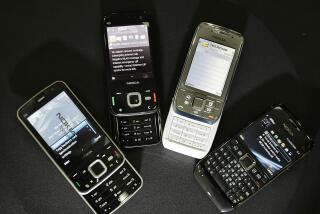Is your smartphone making you fat and lazy?
- Share via
Were you planning on running this morning, but wasted too much time reading Twitter messages on your iPhone? When you do make it to the gym, do people give you the evil eye because you sit on a weight machine and text with a friend?
If you answered yes to either question, you may be turning into a “hyper-connected” couch potato.
According to a study published in the International Journal of Behavioral Nutrition and Physical Activity, frequent cell phone users were far more likely to forego or disrupt physical exercise and scored lower on fitness assessments than peers who used cell phones less frequently.
Though the compact size and mobility of smartphones would seem to facilitate physical activity, the ever-present lure of e-mail, text messages, Facebook, Twitter, games, Pinterest, Instagram, surfing the web, sharing photographs or talking with friends and family is having the opposite effect for some.
“While cell phones provide many of the same temptations as television and Internet connected computers, the difference is that cell phones fit in our pockets and purses and are with us wherever we go,” wrote the Kent State University researchers. “Thus, they provide an ever-present invitation to ‘sit and play.’”
The study began with a random survey of 305 college students, who were each asked about their cell phone usage, according to lead author Andrew Lepp, an associate professor of recreation, parks and tourism management, and his colleagues.
Students who logged just over 90 minutes a day were considered low-frequency users; those who averaged about 5 hours a day were considered moderate users. Students who spent up to 14 hours on their phone were considered heavy users.
In the second phase of the study, 49 of the surveyed students were randomly selected for physical examination. The students ran on a treadmill until they were exhausted, to determine their cardio-respiratory fitness, and they had their body fat content measured.
Authors found that heavy smartphone users were more inclined toward sedentary behavior than light users. The heavy users also had lower levels of cardiorespiratory fitness than those with lower use.
Study subjects reported that heavy usage had negative effects on their activity level.
“Now that I have switched to the iPhone, I would say it definitely decreases my physical activity, because before I just had a Blackberry,” one heavy user told researchers. “Now, if I’m bored, I can just download whatever I want and just sit there and play.”
Another heavy user agreed.
“One of my friends called me during my workout, and like, I haven’t talked to her in a while and I had to tell her a lot of stuff. So it kind of distracted me from my workout,” the study subject told authors.
Interestingly, students who fell into the low phone-usage category said the devices made them more active, because they were able to coordinate recreational pursuits with friends.
However, once they were engaged in a physical activity, the low-use subjects were more like to shut off their phone or put it aside.
Return to Science Now blog.
Follow me on Twitter @montemorin







